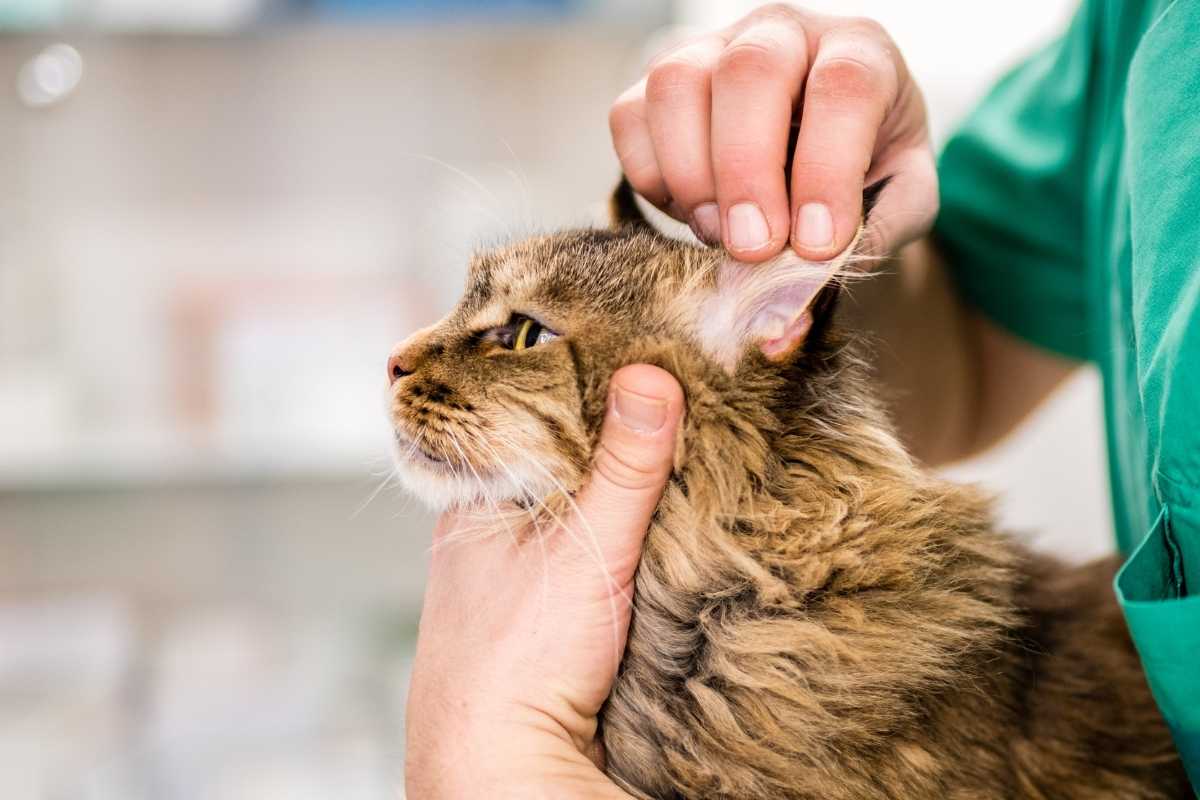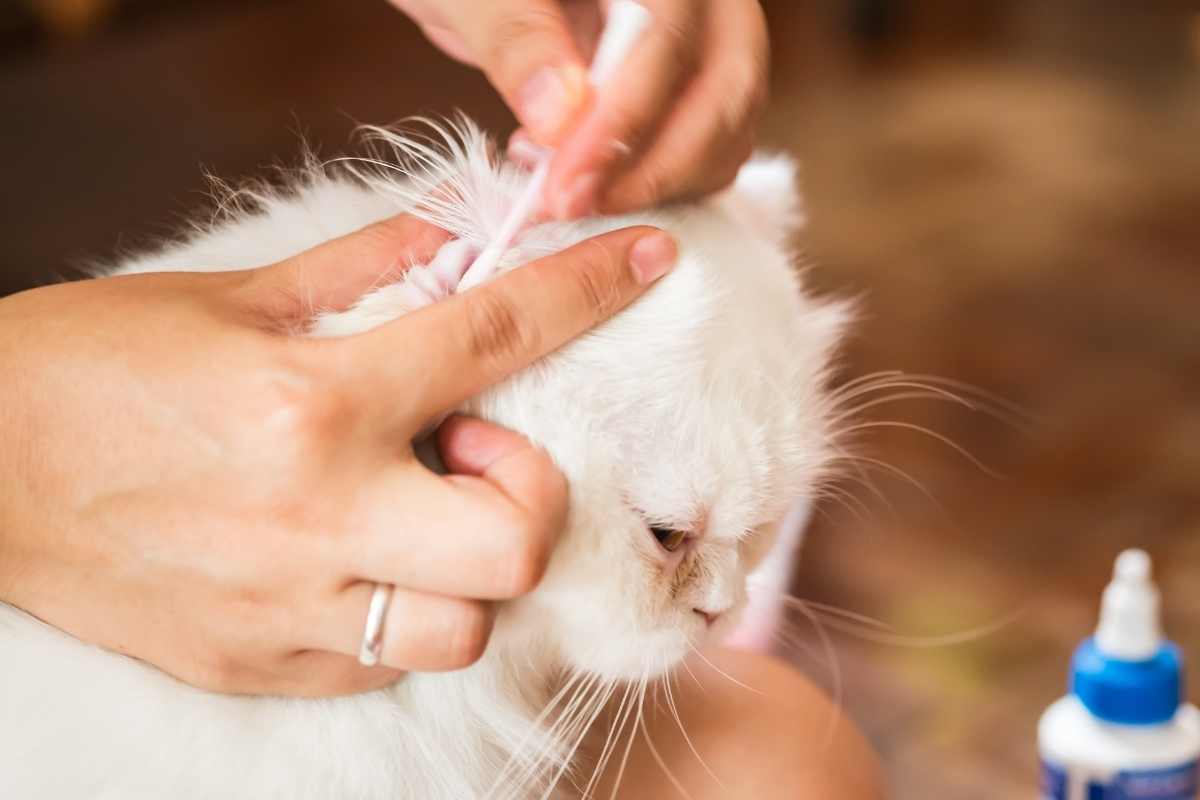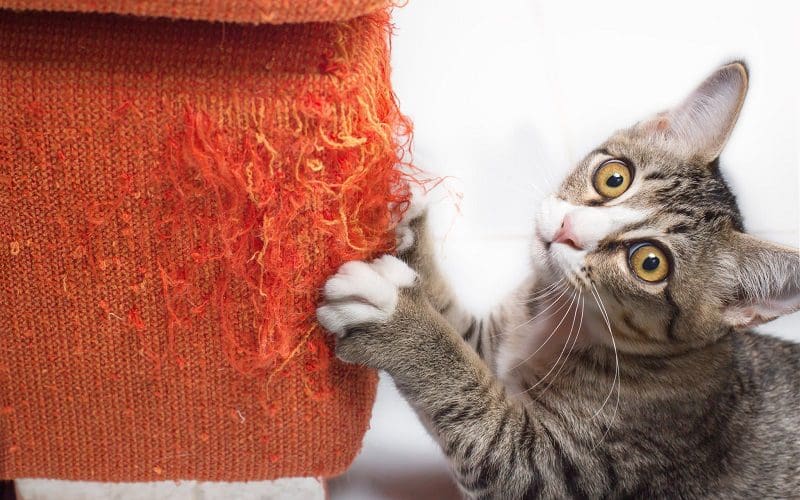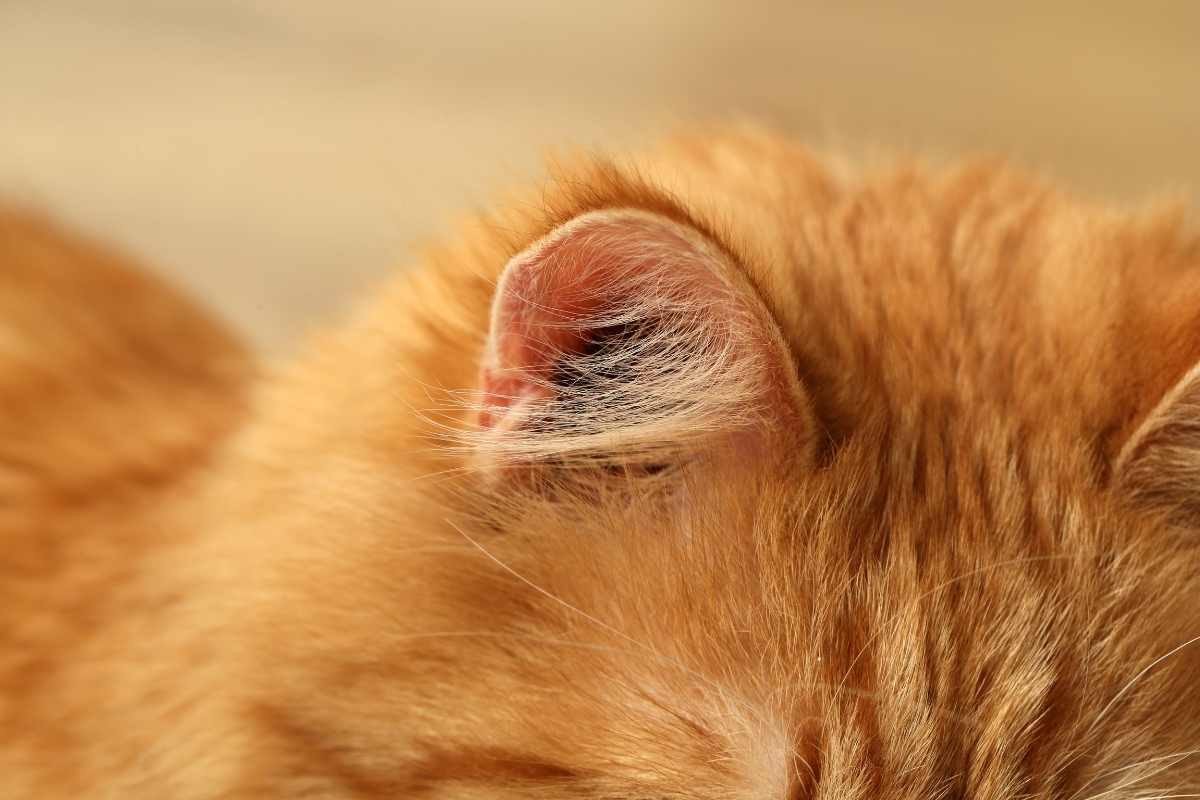Last Updated: 2 years ago
Caring for your pet can be challenging at times.
It is our responsibility to keep a close eye on the health of our pets and ensure they are comfortable, healthy, and well looked after.
The task is made even harder because our pets can’t tell us how they feel. This often leaves us wondering what could be wrong when, in truth, the situation could be something very simple.
A good example of this is with our cats. It isn’t uncommon for a cat’s ears to feel hot. However, knowing what it is can be tricky.
It could be something as simple as the cat’s natural body temperature, an allergic reaction, or something more serious like an illness or infection.
This could leave you pondering whether to take your cat to the vet or not. The fact that you’re here would suggest you’re having that dilemma.
Try not to worry, though, because we’re here to help. Let’s take a look at the five reasons why are my cats ears hot.
5 Possible Reasons Why Your Cat Has Hot Ears
There are a range of different reasons why your cat’s ears might feel hot.
Some of the reasons are super simple and nothing to worry about, while others can be more serious, and require medical attention.
The reason why your cat might have hot ears usually falls into one of five different categories. Those categories are illness, infections, heatstroke, allergies, and body temperature.
To help you understand each reason, we’ll now look at each one in more depth.
#1 Illness

More often than not, illness is a common reason a cat’s ears are hot.
Just like with us humans, when we get ill our body temperature starts to rise.
This is known as a fever. The same goes for cats. When your cat falls ill, you can expect its body temperature across its whole body to rise.
Fever is a great way of monitoring the health status of your cat. If you notice a dramatic change in temperature over a number of days, there’s a good chance your cat has an illness.
In a lot of cases, a fever helps us realize that our pets aren’t feeling well. Identifying a fever can also help us spot underlying diseases.
With this in mind, you should stay observant. When touching your cat’s ears, note how hot they are. If the ears are mildly hot, you don’t need to worry too much.
However, if the heat is intense, you should contact a veterinarian. Intense heat is a good sign that your cat is trying to fight off an illness. A veterinarian can help diagnose the illness.
Other symptoms of illness include lethargy, lack of appetite, vomiting, and excessive howling.
#2 Infections

Your cat’s ears are susceptible to infections. This is mainly down to how fragile they are.
As a result, an increased temperature in your cat’s ears could be a sign of infection. The cat’s ear is split into two different parts. They have an inner ear and an outer ear.
Either part of the ear can become infected at any time. However, there are common causes that are more likely to lead to an infection. These common causes include:
- Mites
- Untreated allergies
- Foreign objects
- Poor hygiene
- Bacteria and viruses
Ear infections can be quite serious for a cat. If the infection is left untreated, your cat could be left with permanent ear damage.
With that in mind, you need to be extremely vigilant when monitoring the heat of your cat’s ears.
If you notice any significant changes or excessive scratching around the ears, you might need to take action.
A veterinarian will be able to treat the infection. Once treated, most viral ear infections clear up after one or two days. If left untreated, the infection could last for over a week.
It’s also important to note that the infections caused by bacteria are usually a lot more severe than viruses. Injury and inflammation usually accompany this sort of infection.
#3 Heatstroke

Another common cause of hot ears in a cat is heatstroke. Humans and cats don’t respond to heat in the same way.
While humans easily adapt and cope with a change in temperature thanks to the sweat glands found all over our bodies, cats are slightly different. Cats only have a handful of sweat glands found around their nose and feet.
Because of this, most felines rely on panting and external cooling to lower their temperature. This, along with their long, furry coats makes the cat much more susceptible to heatstroke.
On top of that, indoor cats find it much harder to lose the heat from their body than outdoor cats.
This increases the likelihood of heatstroke and often results in most indoor cats having a much higher temperature than their outdoor counterparts.
If you suspect that your cat is suffering from heatstroke, you have the responsibility as a cat owner to do something about it. Luckily, the solution is quite easy.
To protect your pet, ensure they have access to a well-ventilated room. This will give your cat an area where it can cool down. You should also ensure that it always has access to cold drinking water.
#4 Allergies

Just like us, cats can suffer from allergies.
In fact, there’s a good chance your cat’s ears could increase in temperature and feel hot to touch if your cat is suffering from an allergy.
This is also very likely if the hot ears are accompanied by redness and excessive scratching. It is important to know that humans and cats react to allergies very differently.
While we react with coughing, red eyes, and sneezing, cats experience a rise in body temperature and itchiness.
There are a variety of different allergens that can lead to your cat’s ear rising in temperature. Some of the most common allergens to be aware of include:
- Dust
- Particles
- Diet
- Fleas
If you notice your cat’s ears becoming hot regularly or other symptoms of allergies, you should take your cat to a vet straight away.
Serious allergies can be potentially fatal. If your cat is continuously exposed to allergens, it will almost definitely fall ill, so be careful.
#5 Warm Body Temperature

Finally, another common reason why your cat might be experiencing hot ears is because cats have a naturally high body temperature.
Most cat owners have worries that their cat’s ears are hot when in reality they could simply be the same temperature as normal.
What a lot of owners don’t realize is that they don’t regularly touch their cat’s ears, so how can they be sure their cat has a fever?
The normal temperature for a cat’s body is 102.5 °F. That is higher than the normal body temperature of a human but absolutely perfect for a cat.
On top of that, your cat’s body temperature will not remain constant all day. Instead, it will fluctuate over the course of the day.
Of course, the temperature of the environment around your cat will also affect things. One important thing to remember is that your cat’s ears are more susceptible to temperature change.
This is because the outer part of its ear contains no fat, which makes them very thin. Your cat’s tail, nose, and paws are also susceptible to temperature change.
Bearing this in mind, before rushing to any decisions, you should always monitor your cat’s temperature first.
What Should You Do If Your Cat’s Ears Feel Hot?
Now you know what could be causing your cat’s hot ears, let’s start looking at what you should do if you notice a change in temperature.
Generally speaking, it’s fine for your cat’s ears to feel hot. However, if your cat isn’t comfortable, you have to act. Your cat’s temperature should be spread evenly across its body.
Having said that, you also need to consider that your cat’s ears are used to regulate body temperature so its ears might be a little hotter.
For obvious reasons, if your cat has been sitting in the sun, its ears could also be hotter.
Taking all of this into consideration, you should first monitor the temperature of your cat’s ears and its behavior before doing anything else.
If your cat doesn’t demonstrate any unusual behavior and the temperature doesn’t continue to increase, you don’t need to worry. Just continue to monitor the health of your cat.
However, if your cat displays signs of discomfort and the temperature continues to rise, you should take your cat to the vet immediately.
The vet can then find out what is wrong and treat your cat accordingly.
How Can You Prevent Your Cat From Having Hot Ears?
Your cat’s hot ears aren’t necessarily a bad thing. Its ears could simply be hot because your cat has spent time in a hotter room or outside in the sun.
However, that doesn’t mean you shouldn’t take action to make sure your cat has the best chance of staying healthy.
There is a wide range of simple things you can do to ensure your cat stays healthy and avoids any unwelcome rises in temperature.
One of the easiest things you can do is provide your cat with access to a well-ventilated room and provide it with fresh cold water.
You should also guarantee that your cat has a clean living environment and good hygiene. On top of that, you should give your cat a well-balanced, healthy diet.
Finally, regularly monitoring the health status of your cat will help you quickly identify any potential problems such as heatstroke, allergies, illness, and infection.
Can A Cat Get Hot Ears When It’s Stressed?
Interestingly, a cat’s ears can become hot when stressed. This is due to physiological changes in the cat’s body.
There are a lot of factors that can lead to higher levels of stress in a cat, making it more difficult to identify if that is the problem.
However, one of the most common causes of stress in a cat is a change in environment. This is a very significant factor responsible for the stress most cats experience.
This change in environment can be something as simple as someone new visiting the house or a room being reorganized.
More serious stresses could be caused by the introduction of a new pet or the moving of a house. If stresses aren’t dealt with and controlled by the owner, the cat’s health will suffer.
Always try your best to keep an eye on your cat’s happiness levels. Common signs of stress include:
- Restlessness
- House soiling
- Becoming withdrawn
- Lack of sleep
- Overly hot ears
Should Your Cat’s Ears Be Cold?
Hot ears aren’t the only thing that could be a sign that your cat is suffering from some form of illness. Cold ears can also be a sign that your cat isn’t feeling right.
As a general rule of thumb, temperatures below 45 °F are considered too cold.
This could be a sign that the home is simply too cold or that your cat has a problem.
Either way, you need to do something about it. First of all, you should start by doing what you can to keep the cat warm.
If the cat seems to be cold as a result of house temperature, try raising the temperature. If that doesn’t work, you should most definitely take your cat to the vet.
Signs to look out for when deciding if your cat is too cold include:
- Trembling
- Shivering
- Curling up in the bed
- Cuddling into hotter spaces
How To Check Your Cat’s Temperature
Checking your cat’s temperature might sound challenging but it’s actually very straightforward. We’ve outlined some tips for you below:
- Aim a digital thermometer at the cat’s ears. To get a more accurate reading, use a rectal thermometer instead.
- Never use a mercury thermometer as there is a chance it could break.
- If you decide to use a pediatric rectal thermometer, apply some petroleum jelly to the thermometer first.
- Gently and slowly insert the thermometer into the cat’s rectum. Be very careful so you don’t damage any rectal tissue.
- Leave the thermometer inside your cat for two minutes.
- Remove the thermometer gently and look at the reading.
- You might need assistance during the process to hold your cat still.
In Summary
To summarize, your cat could be experiencing hot ears for a variety of reasons.
The most common of those are illness, infection, allergies, heat stroke, and the fluctuation of your cat’s natural body temperature.
We’ve taken a closer look at the different reasons, showing you what you need to think about, what you should look out for, and what you should do if you suspect or identify any issues.
While it is generally okay for a cat to have hot ears if you notice any unusual behavior or distress, you should seek veterinary advice immediately.
It might turn out to be nothing, but it’s always best to guarantee your cat’s health.
Aside from that, you can keep your cat happy and healthy by monitoring it closely and by providing it with a healthy lifestyle.
Resources:
